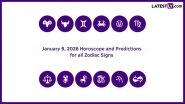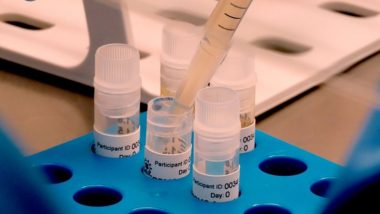Washington, October 14: Immunity against COVID-19 may persist for at least five months after being infected with the SARS-CoV-2 virus, according to a study led by an Indian-origin researcher in the US.
The researchers from the University of Arizona studied the production of antibodies from a sample of nearly 6,000 people infected with the novel coronavirus.
"We clearly see high-quality antibodies still being produced five to seven months after SARS-CoV-2 infection," said Deepta Bhattacharya, associate professor at the University of Arizona. "Many concerns have been expressed about immunity against COVID-19 not lasting. We used this study to investigate that question and found immunity is stable for at least five months," who led the study, published today in the journal Immunity, alongside Professor Janko Nikolich-Zugich from Arizona. Also Read | COVID-19 Vaccine Update: Johnson & Johnson Suspends Coronavirus Vaccine Trials in Brazil.
When a virus first infects cells, the immune system deploys short-lived plasma cells that produce antibodies to immediately fight the virus, the researchers explained. Those antibodies appear in blood tests within 14 days of infection, they said. The second stage of the immune response is the creation of long-lived plasma cells, which produce high-quality antibodies that provide lasting immunity, according to the researchers.
Bhattacharya and Nikolich-Zugich tracked antibody levels over several months in people who tested positive for SARS-CoV-2 antibodies. They found SARS-CoV-2 antibodies are present in blood tests at viable levels for at least five to seven months, although they believe immunity lasts much longer.
"Whether antibodies provide lasting protection against SARS-CoV-2 has been one of the most difficult questions to answer," said UArizona Health Sciences Senior Vice President Michael D Dake.
"This research not only has given us the ability to accurately test for antibodies against COVID-19, but also has armed us with the knowledge that lasting immunity is a reality," Dake said.
Earlier studies extrapolated antibody production from initial infections and suggested antibody levels drop quickly after infection, providing only short-term immunity.
Bhattacharya believes those conclusions focused on short-lived plasma cells and failed to take into account long-lived plasma cells and the high-affinity antibodies they produce. COVID-19 Tests in India Cross 9 Crore; 20 States, UTs Report Positivity Rate Less Than National Average.
"The latest time-points we tracked in infected individuals were past seven months, so that is the longest period of time we can confirm immunity lasts," Bhattacharya said. He said people who were infected with the first SARS coronavirus, which is the most similar virus to SARS-CoV-2, are still seeing immunity 17 years after infection.
"If SARS-CoV-2 is anything like the first one, we expect antibodies to last at least two years, and it would be unlikely for anything much shorter," the scientist added.
(The above story is verified and authored by Press Trust of India (PTI) staff. PTI, India’s premier news agency, employs more than 400 journalists and 500 stringers to cover almost every district and small town in India.. The views appearing in the above post do not reflect the opinions of LatestLY)













 Quickly
Quickly


